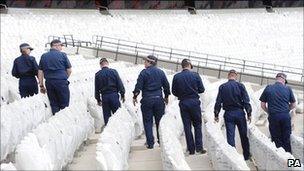London 2012: Troops 'may be used to bolster security'
- Published

Eleven police forces and the military are involved in the security effort for London 2012
Thousands of British soldiers may be called in to bolster private security guards at London 2012 venues.
Olympics organisers Locog have contracted private firm G4S to supply 10,000 security guards for the Games.
But the Financial Times cited a new government risk assessment as saying that up to 20,000 guards were needed.
"We will make the best and most appropriate use of available resources," a government spokesman told the BBC.
The FT reported that the Ministry of Defence was being consulted on how to meet the security shortfall, external, just nine months ahead of the opening ceremony on 27 July.
While not commenting on the specific details of the report, the Home Office spokesman confirmed the MoD would be providing assistance separate to the venue security operation at the Games.
The MoD was "fully involved" in supporting security plans, he told the BBC, adding that Olympic venue security requirements were being finalised by the government in conjunction with Locog and G4S.
"We are committed to delivering a safe and secure Games that London, the UK and the world can enjoy," said the spokesman. "It is expected that the armed forces will provide the civilian authorities with some specialist support."
A G4S spokesman said the firm would be announcing a recruitment drive in the next couple of weeks.
Extra police
The Olympics is set to be one of the UK's biggest security tests - a 64-day operation, from when the Olympic village opens on 13 July to the time the Paralympic village closes on 12 September, covering 34 venues across Britain.
It comes in the wake of riots across England this summer - the country's worst for three decades.
Eleven police forces and the military are involved in the security effort, which has a budget of up to £600m.
While extra police officers and support staff are being taken on, Metropolitan Police Director of Resources Anne McMeel said this week she was concerned about the impact of police cuts on short-term redeployments.
The Met had hoped the extra staff would be absorbed into the force as part of natural expansion after the Games.
But Ms McMeel told the London Assembly: "Over the last two years the numbers have been shrunken and that makes redeploying into the organisation a tougher call."
The government says safety and security funding for the Games has been protected, with the vast majority going to the police in order to give it the resources to deliver a safe and secure Games.
As well as London 2012's £600m security budget, the Games has a £2bn contingency budget, part of which can be drawn on for security purposes. These figures do not include an undisclosed counter-terrorism budget.
Chris Allison, the national Olympic security co-ordinator, said this week that the full cost of Olympic security would not be known until after the Games.
"I can't tell you what the final costs are going to be... I just don't know," he told the London Assembly.
Reports suggest any financing for troop assistance would come from London 2012's £9.3bn budget, rather than police or MoD coffers.
The build-up to the Athens Olympics in 2004 was marred by security fears following bomb attacks on the Greek capital in the months leading up to the Games.
- Published1 November 2011
- Published26 July 2011
- Published13 January 2011
- Published13 December 2010